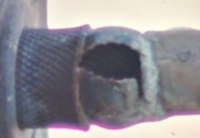This is an inlet to a solar water heater panel sitting exposed to the elements for about 20 years. This pipeline was drained for a while because the old solar heater tank failed and I took my own time to plumb it back up. After enabling the lines, I noticed that the copper pipe going into the panel had burst open. Temperatures here never hit freezing (50F in the last few days).
I would appreciate any opinion on if the crack was just metal fatigue, or some reason I'm driving too much pressure, or did it somehow freeze and expand (during the earlier failure of the older heater).
I would appreciate any opinion on if the crack was just metal fatigue, or some reason I'm driving too much pressure, or did it somehow freeze and expand (during the earlier failure of the older heater).

